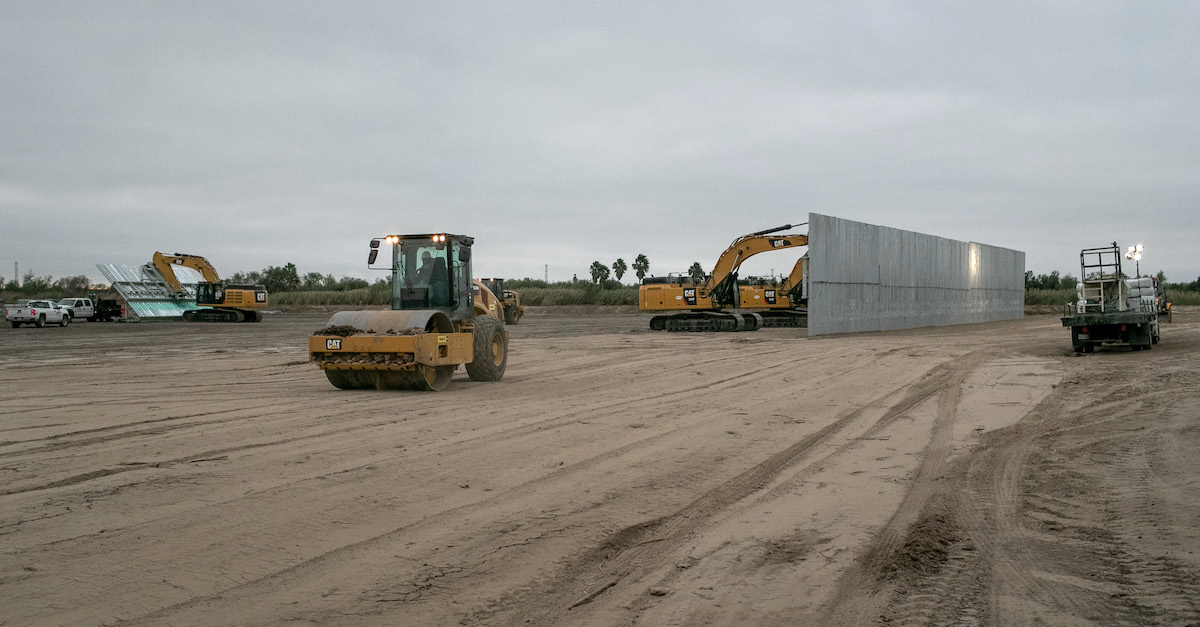
A construction roller flattens land for a section of privately built border wall on Dec. 11, 2019 near Mission, Texas. The hardline immigration group We Build The Wall is funding construction of the wall on private land along a stretch of the Rio Grande, which forms the border with Mexico.
A federal judge dismissed the Department of Justice’s lawsuit against a contractor who made billions under former President Donald Trump’s administration, after the parties agreed to settle years-old environmental claims.
In late 2019, the federal government sued the non-profit group We Build the Wall and three other companies as part of a spate of litigation over their controversial plan to build barriers along U.S.-Mexico border. The latest wrinkle in that courtroom drama involves construction companies belonging to Tommy Fisher, who scored a reported $2 billion in border-wall contracts.
Those companies, Fisher Industries, Fisher Sand and Gravel Co. and subsidiary TGR Construction, entered into an agreement with Texas landowner Lance Neuhaus to build a 3-mile fence of steel posts on his property, but a neighboring nature preserve claimed that building the bollard would wreak havoc to their property.
The U.S. International Boundary and Water Commission (IBWC) argued that the disruption would be international, changing the shoreline and potentially violating a U.S.-Mexico water treaty that has been on the books for more than half a century.
On Tuesday, the Department of Justice and the construction companies asked to dismiss the case pursuant to an undisclosed settlement, and a federal judge quickly agreed.
“The USIBWC is pleased this litigation has been settled,” the agency’s U.S. Secretary Sally E. Spener told Law&Crime in a statement.
She said that the 34-page settlement addresses the agency’s key concerns, including the potential for deflection of flow, erosion of the riverbank or collapse of the fence. The deal mandates regular inspection and maintenance of the riverbank and the fence.
“TGR and Fisher Industries agree to allow the USA/USIBWC access to the property to conduct a visual inspection of the project on a mutually agreeable date once every quarter of a 12-month calendar year, or as needed after rain events and or a flood event, as long as TGR or any entity of Fisher Industries or their successors owns the property,” the settlement states.
Representatives for the Department of Justice and Fisher Industries did not respond to Law&Crime’s requests for comment.
According to the nature preserve bordering the construction, the National Butterfly Center, the construction violated a 1970 U.S. water treaty with Mexico. Regulators at the U.S. International Boundary and Water Commission made a similar argument in federal court in December 2019.
“As result of the bollard fence project and the modification to a ‘beached’ bank, the bank of the Rio Grande River has shifted, causing potential losses and/or gains in territory to the United States and Mexico,” the government’s amended complaint states.
Earlier in May, the Department of Justice indicated that the parties were close to reaching a settlement.
“Since the last status conference, the parties have resolved the remaining issues and have agreed to a settlement of this case,” the Justice Department wrote on May 12. “Additionally, approvals from the appropriate federal officials have been obtained. The Fisher Defendants and the United States are in the process of finalizing the settlement documents and obtaining necessary signatures subject to the finalization of documents.”
Shortly after the Justice Department and Fisher filed a stipulation of dismissal, U.S. District Judge Randy Crane agreed to terminate the case with prejudice, meaning that it cannot be refiled. Crane is a George W. Bush appointee.
Though the now-dismissed case was a civil suit, former executives connected to We Build the Wall have been prosecuted criminally.
In New York, We Build the Wall’s executives Brian Kolfage, Steve Bannon, Andrew Badolato and Timothy Shea were indicted for allegedly conspiring to defraud donors and plotting to launder their ill-gotten gains. Federal prosecutors in Florida separately accused Kolfage of hiding money from tax authorities.
Trump pardoned Bannon, his former chief strategist, in connection with the alleged scheme, but the former president did not offer clemency to his co-defendants. Two of them, Kolfage and Badolato, recently pleaded guilty to conspiracy to defraud donors. Shea decided to fight the charges at a trial, which is ongoing.
We Build the Wall was quickly dismissed from the Texas litigation as a civil defendant and was not a party to the settlement.
Neither Fisher Industries, Fisher Sand and Gravel, Neuhaus and Sons, nor any of the people associated with those company has been accused of criminal wrongdoing. Neuhaus was terminated as a defendant from the civil case in May 2021.
Update—May 31 at 6:15 p.m. Eastern Time: This story has been updated, with a new headline, to include information about the 34-page settlement and comment by IBWC.
Read the settlement, below:
(Photo by John Moore/Getty Images)